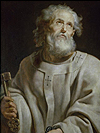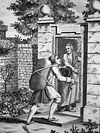|
Palestine
Name of a historical and geographical region in
the Eastern Mediterranean, situated at the crossroads of Southwest Asia,
North Africa, and Europe. Palestine, from the Latin Palaestina, derived
from the Greek Palaistinē (Παλαιστίνη), itself from the Hebrew Peleshet
(פְּלֶשֶׁת), meaning “Philistia” generally designates the area between
the Mediterranean Sea and the Jordan River, extending southwards to the
Negev Desert and northwards toward the Lebanese mountains. The earliest
form, Peleshet, appears in ancient Egyptian and Hebrew sources,
referring to the
Philistines,
an Aegean people who settled along the southern coastal plain in the
twelfth century BC. The term Palaestina was later adopted by the Romans
after suppressing the Bar Kokhba Revolt in 135 AD, when Emperor Hadrian
renamed the province Syria Palaestina to diminish Jewish association
with Judaea and Jerusalem. Throughout Byzantine, Islamic, and Crusader
periods, the name persisted in various administrative or geographic
forms. During the Ottoman era (1516–1917), the territory corresponding
to modern Palestine was not a single unit but comprised several
districts (sanjaks) within larger provinces (vilayets). Under the
British Mandate (1920–1948), “Palestine” became an official political
entity following the dissolution of the Ottoman Empire, encompassing the
territories of present-day Israel, the West Bank, and the Gaza Strip, as
well as Jordan east of the Jordan River until 1922. Following the
establishment of the State of Israel in 1948, the term “Palestine” has
primarily referred to the territories of the West Bank, including East
Jerusalem, and the Gaza Strip, as well as the Palestinian national
identity and aspirations for statehood. Beyond its geographical meaning,
Palestine has long carried religious, cultural, and symbolic
significance, being regarded as the Holy Land by Judaism, Christianity,
and Islam, and encompassing numerous sacred sites such as Jerusalem,
Bethlehem,
Hebron, and
Nazareth.

Pentateuch
Name derived from the Greek word Pentateuchos (Πεντάτευχος), meaning
“Five Books”
and referring to the first five books of the Hebrew Scriptures and
the Christian Old Testament, i.e. Genesis, Exodus, Leviticus, Numbers and Deuteronomy.


Petros (Πέτρος)
Greek name for Peter, a leader of the early
Christian church, who was one of Twelve Apostles, chosen by Christ from
his first disciples. He was a Galilean fisherman and was with Jesus
during events witnessed by only a few apostles, such as the
Transfiguration. Roman Catholic tradition claims that he was the first
Bishop of Rome and hence the first Pope. He is the author of two
canonical epistles and a martyr, who was crucified upside down during
the reign of Nero, and buried in Rome. In art, he is habitually depicted
holding the keys to the kingdom of heaven. In Hebrew, he is called
Shim‘on (שִׁמְעוֹן), usually rendered in Greek as Simōn (Σίμων) and
transliterated into English as Simon, whereas in Aramaic, he is known as
Kepha (כֵּיפָא), meaning “rock”, a name translated into Greek as Petros
(Πέτρος) and into English as Peter.


Philip Melanchthon
A German Lutheran reformer, theologian, scholar,
and humanist, renowned as
Martin Luther's closest collaborator
and the first systematic theologian of the
Protestant
Reformation.
Born in Bretten on 16 February 1497 as Philipp Schwartzerdt, he was the
son of Georg Schwarzerdt, an armourer, and Barbara Reuter, and studied
at Pforzheim, Heidelberg, and Tübingen, excelling in Greek and
philosophy. Influenced by his great-uncle, the humanist Johann Reuchlin,
he Hellenized his surname Schwartzerdt, which means “black earth” in
German, to the Greek equivalent Melanchthon (Μελάγχθων). In Greek, melas
(μέλας) means “black” and chthōn (χθών) means “earth” or “soil”, so
Melanchthon literally translates to “black earth”. He adopted this name
in accordance with the humanist custom of Hellenizing surnames. At 21,
he became professor of Greek at the University of Wittenberg, where he
met
Martin Luther and quickly became a key
ally, teaching Scripture and systematizing Lutheran theology. His Loci
Communes (1521) was the first
Protestant
dogmatic textbook, emphasizing salvation by faith alone. Melanchthon
played a central role in drafting the Augsburg Confession (1530) and its
Apology, defending Lutheran doctrine against Catholic objections. He was
also a major figure in educational reform, reorganizing schools and
universities to integrate humanistic learning with theological
instruction, earning him the title Praeceptor Germaniae (Teacher of
Germany). Following
Martin Luther's death, he emerged as
the intellectual leader of the Lutheran
Reformation,
though his moderate positions during the Interim controversies and
debates over the Lord’s Supper drew criticism from stricter Lutherans.
Theologically, he emphasized justification by faith, moral discipline,
and the unity of divine law and Gospel, allowing a role for human will
in conversion and seeking reconciliation between revelation and reason.
A prolific writer, he produced commentaries on Scripture, catechisms,
works on ethics and philosophy, and treatises on education, including
Epitome Philosophiae Moralis (1538) and Ethicae Doctrinae Elementa
(1550). Physically frail but intellectually formidable, he was known for
moderation, humility, and devotion to peace, maintaining a devoted
domestic life and extensive scholarly correspondence. He died in
Wittenberg on 19 April 1560 and was buried beside Luther in the
Schlosskirche. Melanchthon’s synthesis of humanism and theology
profoundly shaped
Protestant
thought and education, providing the intellectual structure of
Lutheranism and balancing faith with reason and doctrine with learning,
and he is commemorated in Lutheran calendars on 16 February and 25 June.


Philistines
The Philistines are considered one of the Sea Peoples, a confederation
of maritime raiders who disrupted the eastern Mediterranean during the
Late Bronze Age (approximately 1250–1150 BC). The name “Philistine” is
derived from the Hebrew word P'lishtim (פלשתים), with connections to the
root p-l-sh (פלש), meaning “to roll” or “to invade”, suggesting a
historical context of migration and conquest. Ancient Egyptian
inscriptions refer to the Philistines as the Peleset, and they are
believed to have arrived in the southern coastal regions of Canaan
around 1200 BC, coinciding with the period of the Late Bronze Age
collapse. The Philistines established a pentapolis of five city-states:
Gaza, Ashkelon, Ashdod, Ekron, and Gath, and their culture reflects a
mixture of Aegean and local influences. The Philistines are first
mentioned in biblical texts during the period of the Judges
(approximately 1200–1020 BC), continuing into the establishment of the
Israelite monarchy (c. 1020 BC – 930 BC). They were significant
adversaries of the Israelites, portrayed prominently in conflicts during
this time. In the Judges period, they oppressed the Israelites, as
depicted in the story of Samson (Judges 13–16). The narrative of David
and Goliath exemplifies the ongoing struggle, as David's victory over
Goliath marked a critical point in the conflict between the two groups.
The Philistines faced significant defeats under David's reign, leading
to a decline in their political power and distinct identity by the end
of the 11th century BC. By the 6th century BC, following conquests by
the Babylonians and other empires, the remaining Philistine cities fell
into decline, leading to their assimilation into surrounding cultures.
The historical connection between the ancient Philistines and
present-day Palestinians is a topic of considerable discourse. While
both share a relationship to the term “Palestine”,
which is derived from “Philistia”, modern Palestinians identify largely
as an Arab ethnonational group. The Palestinian identity emerged in the
late 19th and early 20th centuries, influenced by the socio-political
landscape of the region, especially in relation to Zionist movements and
colonialism. While contemporary Palestinians may have ancestral roots
that trace back to various groups in the region, including ancient
Canaanites and Arabs, a direct lineage connecting them specifically to
the ancient Philistines is complex and not concretely established. The
legacy of the Philistines is part of the broader historical tapestry of
the region, but does not serve as a direct ancestral link to modern
Palestinian identity.

Pilgrim's Progress
A Christian allegorical story written by
John
Bunyan in two parts, of which the first one was
published in 1678. It describes the journey of a man named
Christian, from “this world to that which is to come”, i.e. from his
hometown, metaphorically called the “City of Destruction”, to heaven or
the “Celestial City”. The narrative is delivered under the similitude of
a dream and the protagonist finds himself weighed down by a
great burden, i.e. his sins, which would cause him to sink into hell. He
then meets Evangelist, who shows him the way to salvation through the
“Wicket Gate”, where he is directed by “Good Will” (Christ) to the “Place of Deliverance”,
i.e. the Cross, to be relieved from his burden. Though, before
that and on his way
over to the “Wicket Gate”, Christian is diverted and obstructed by
all sorts of abstractions and people, including members of his own
family, who try to keep him from leaving his hometown or from reaching his
goal. As Christian passes through different stages of his journey, he
meets places and personages with allegorical names, revealing their
intent or nature. Characters in the story bear names such as “Mr. Worldly
Wiseman”, “Obstinate”, “Pliable” and the “Giant Despair”, while places include
names like the “Slough Of Despond”, the “Hill of Difficulty”, “Doubting
Castle”, the “Valley of the Shadow of Death”, etc. The story is steeped in
Biblical paraphrases and became so popular that it is the most read book
after the Bible.


Pishon (פישון)
Name of one of four
rivers mentioned in
Genesis 2:11, along with the
Gihon,
Tigris and
Euphrates. It is described as a mountain stream arising
within the Garden of
Eden
and encircling “the entire land of Havilah”.
The Jewish-Roman historian Flavius Josephus identified the Pishon with
the river Ganges. Also transcribed Pison. See also
Gihon.

Pneumatomachian heresy
A fourth-century theological doctrine that denied
the full divinity of the Holy Spirit. Its adherents accepted the Father
and the Son as fully divine but regarded the Holy Spirit as a created
being, subordinate to them. The term Pneumatomachian derives from the
Greek words pneuma (πνεῦμα), meaning “spirit”, and machē (μάχη), meaning
“fight” or “battle”, and thus literally means “those who fight against
the Spirit”. This heresy was condemned by the
First Council of Constantinople in 381
AD, which affirmed that the Holy Spirit is fully divine and worshipped
equally with the Father and the Son, a declaration incorporated into the
Nicene-Constantinopolitan Creed. This
false doctrine is also known as
Macedonianism, after
Macedonius I, a bishop of
Constantinople who was twice deposed and eventually exiled, and who was
associated with the development of the heresy denying the full divinity
of the Holy Spirit.

predestination
Theological doctrine which asserts that God, in
His sovereignty, has eternally determined the ultimate fate of every
individual, deciding in advance who will be saved (the elect) and who
will be condemned (the reprobate). In this view, salvation is entirely
dependent on God’s will and not on human merit or actions.
Predestination is most closely associated with
Calvinist
and theology, though concepts of divine foreordination also appear in
other Christian traditions. It emphasizes God’s omniscience and
omnipotence, often raising questions about human free will and
responsibility.

Presbyterianism
A branch of
Protestant
Christianity characterised by a distinctive form of church governance in
which authority is vested in assemblies of elders, known as presbyters,
rather than in a hierarchical system led by bishops. The term derives
from the Greek presbyteros (πρεσβύτερος), meaning “elder.” It originated
during the 16th-century
Reformation,
primarily under the influence of the French theologian John Calvin and
the Scottish reformer
John Knox. Presbyterianism became
especially prominent in Scotland, where it developed into the national
church and later spread to England, Ireland, North America, and various
regions of Africa and Asia. Doctrinally, Presbyterianism adheres to
Reformed theology, emphasising the sovereignty of God, the authority of
Scripture, salvation by grace through faith, and the priesthood of all
believers. Its principal confessional standards include the Westminster
Confession of Faith (1646) and the Shorter and Larger Catechisms. Church
governance operates through a representative structure comprising
successive courts: the session at the congregational level, the
presbytery at the regional level, the synod at the provincial or
intermediate level, and the general assembly at the national level.
Ministers and lay elders share authority equally within these bodies.
Worship in Presbyterianism traditionally emphasises simplicity, the
preaching of the Word, and the sacraments of Baptism and the Lord’s
Supper, while many Presbyterian churches also engage actively in
education, social justice, and ecumenical work. Prominent Presbyterian
denominations include the Church of Scotland, the Presbyterian Church
U.S.A., the Presbyterian Church in Ireland, and the Presbyterian Church
of Korea, among others. Presbyterianism shares
Calvinist
theology, including
predestination
and the spiritual presence of Christ in the Eucharist, but differs in
its structured, representative church government. It therefore also
differs from
Lutheranism, which teaches the real,
physical presence of Christ in the Eucharist and generally rejects
strict
predestination.

Protestantism
The branch of Christianity that originated with
the
Reformation
in the 16th century, encompassing the beliefs, practices, and churches
that separated from the Roman Catholic Church. The term derives from the
Latin protestari, meaning “to publicly declare or testify”, i.e. “to
protest”, referring originally to the German princes and reformers who
protested the decisions of the
Diet of Speyer
in 1529. Protestantism emphasizes the authority of Scripture (sola
scriptura), justification by faith alone (sola fide), the priesthood of
all believers, and salvation by God’s grace rather than human works. It
includes numerous denominations, such as
Lutheranism,
Calvinism,
Presbyterianism,
Zwinglianism
and
Anglicanism, which share these core
principles while differing in theology, worship, and church governance.
Though these major branches of Protestantism share the central
Reformation
principles of sola scriptura (Scripture alone) and
sola fide (justification by faith), they differ in sacramental theology,
predestination,
and church governance.
Lutheranism teaches the real, physical
presence of
Christ
in the Eucharist (consubstantiation), generally rejects strict
predestination,
and emphasizes salvation by faith alone.
Zwinglianism
views the Lord’s Supper as purely symbolic, serving as a memorial of
Christ's
sacrifice, stresses biblical authority, and often advocates close
integration of church and civil governance.
Calvinism
emphasizes God’s absolute sovereignty, strict
predestination,
and the spiritual presence of
Christ
in the Eucharist, limiting salvation to the elect,
while promoting a structured, representative church polity.
Presbyterianism
shares
Calvinist
theology, including
predestination
and the spiritual presence in the Eucharist, but is distinguished by a
formalized, representative system of church government led by elders.
Anglicanism, by contrast, blends
Reformation
theology with traditional
Catholic
liturgy and episcopal governance, typically teaching a spiritual or
“real” presence in the Eucharist, affirming justification by faith, and
maintaining a hierarchical structure under bishops while allowing some
doctrinal latitude. Collectively, these branches illustrate the
diversity of Protestantism in interpreting Scripture, sacramental
practice, and ecclesiastical organization.
 |